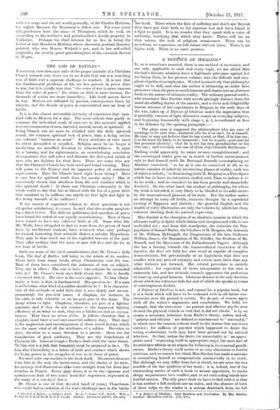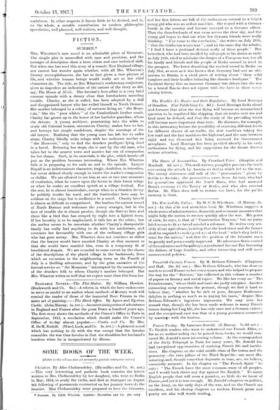A DEFACE OF IDEALISM..
IF, as is sometimes asserted, there is one method of treatment, and one only, applicable to each and every topic, wo are afraid Miss Sinclair's literary admirers have a legitimate grievance against her for luring them, in her present volume, into the difficult and com- plicated paths of metaphysics. We feel instinctively that philosophy ought to be dull, and that the author is attracting us under false pretences when she puts so much humour and charm into an abstruse book on the nature of ultimate reality. The ordinary general reader, who associates Miss Sinclair with novels glaringly distinct from the usual six-shilling fiction of the market, and a vivid and delightfully human account of her experiences in Belgium in the early days of the war, takes up A Defence of Idealism under the impression that it probably consists of light discursive essays on everyday subjects, and beginning honourably with chap. i., p. 1, is confirmed at first in his delusion by the opening paragraph —
" The plain man is supposed (by philosophers who are sure of nothing) to be sure that, whatever else he is or isn't, he is himself. He may or may not believe that he has a soul, or that, if he has one, it is the least bit likely to be immortal ; but he is quite, quite surre ]. has personal identity ; that he is not his own grandmother or his own son ; and certainly not one of those objectionable Robinson." Nothing could apparently be easier or more straightforward ; and the encouraged reader goes on in search of further entertainment only to find himself (with Mr. Bertrand Russell) contemplating an Absolute conceived, " so far as it can be conceived at all, as an infinite number of infinitely intersecting planes of reality, each ono of which is infinite," or floundering (with M. Bergson) in a Pure Space which has to have its interstices stuffed with Time to induce it to do its work; and he considers he has been grossly end shamefully deceived. On the other hand, the student of philosophy, for whom the work is intended, is very likely to be blinded to its solid merits by the unaccustomed glamour of its style. But the author makes no attempt to carry off feeble, insincere thought by a superficial coating of flippancy and rhetoric ; the graceful English and the wealth of witty illustration are only the vehicles by which her clear, coherent thinking finds its natural expression.
Miss Sinclair is the champion of an idealistic monism in which the
ultimate reality is Spirit which thinks and energizes and wills in one undivided act ; and from this standpoint, she criticizes the Pan- psyclsisat of Samuel Butler, the Vitalism of M. Bergson, the Animism of Mr. William McDougall, the Pragmatism of the late Professor William James, the Humanism of Mr. Schiller, the Realism of Mr. Russell, and the Mysticism of Six Rabindranath Tagoro. Although she has a leaning towards the transcendental conviction of the mystics, she does not hold her own creed as capable of complete demonstration, but provisionally as an hypothesis that dock not conflict with any proved certainty and covets more facts than any other hitherto put forward. Her critical procedure is entirely admirable ; her exposition of views antagonistic to her own is eminently fair, and her attitude towards opponents the perfection of courtesy and good humour. Christian Science is the only doctrine about which her tolerance fails her and of which she speaks in terms of contemptuous disdain.
.4 Defence of Idealism is not, and cannot be, a popular book, but
it is a book which will have to be reckoned with in all future con- troversies over the ground it covers: We do not, of course, agree with all the writer's arguments and conclusions. We hold, for example, that the statement "no patient and efficient psyche over desired the physical vehicle or tool that it slid not obtain " is by no means a necessary inference from Butler's theory, unless, indeed, patient and efficient " are defined as tantamount to " successful," in which ease the remark reduces itself to the truism that survivors SUrViV0 ; for millions of psyches which happened to desire the wrong evolutionary tools may have been ground out by natural selection. So that, unless the desire for immortality is an appro- priate need " expressing itself in appropriate ways, the mere fact of its existence affords is no reason for behoving in its eventual gratifi- cation. Butler's theory-itself seems to us very obnoxious to hostile criticism, and we cannot but think Miss Sinclair has made a mistake in committing herself so comparatively unreservedly to its truth. But although we may differ from her in detail, we are none the less sensible of the fuse qualities of her work ; it is, indeed, one of the outstanding merits of such a book to arouse opposition, to excite sleepy acquiescence into conflict, and to set contending minds into fruitful motion. The only grave fault we have to find with it is that it, has neither a full analysis nor an index, and the absence of both of these helps to the reader is a serious drawback from its full • A MI of Ideation Sane Qansesa and Condon... By May Sinclair, London : Macmillan and Co. 1125. net.j,
usefulness. In other respects it leaves little to be desired, and is, on the whole, a notable contribution to modern philosophic speculation, well planned, well written, and well thought.



































 Previous page
Previous page